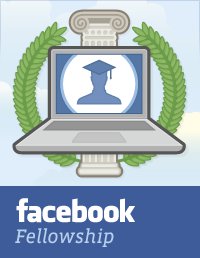2012-2013 Facebook Fellowship winners announced


Here are the winners and what they are up to (think about why Facebook is interested in each of their interests):
- Jeremy Andrus, Columbia University, Mobile Computing. His goal is to revolutionize the mobile market with virtualization solutions that will allow us to use multiple virtual devices on a single physical device. Jeremy will work to unify the mobile user experience by investigating efficient and secure ways to virtualize whole platforms like Android. His work will help facilitate the next generation of mobile virtual appliances, open up new opportunities for mobile cloud-based applications and services, and clear our cluttered pockets of excess devices.
- Mosharaf Chowdhury, University of California, Berkeley, Computer Networking and Cloud Computing. He hopes to elevate the datacenter network to become a first-class resource in cloud computing environments. His research is introducing application-aware network primitives to make datacenter networks more efficient, predictable, and easier to share across multiple entities.
- John C. Duchi, University of California, Berkeley, Machine Learning. His goals are twofold: First, his research studies the growing size of modern datasets that necessitate new, efficient learning algorithms, such as for streaming, online, and distributed data. Secondly, he aims to develop both practical and theoretical understanding of new statistical procedures that allow computers to learn amidst previously difficult problems.
- Tyler Harter, University of Wisconsin, Madison, Storage Systems. He is measuring the Hadoop File System (HDFS). Tyler plans to model HDFS scalability and create an HDFS emulator, and he hopes his work will help meet the scaling needs of growing services on the social web.
- Jeff Huang, University of Washington, Search. He hopes to show that search engines and interactive websites like Facebook can use user interaction data to provide the information their users want more effectively.
- Hyeontaek Lim, Carnegie Mellon University, Distributed systems. He will focus on developing techniques to improve the resource efficiency of distributed systems He hopes to deliver more affordable data-intensive computing, facilitating future innovations for large-scale Internet services.
- Gregory Malecha, Harvard University, Programming Language Technology. He plans to research how extensible program logics can be used to reason about low-level, concurrent software. He believes that the right abstractions enable compositional, high-level reasoning about programs while retaining the ability to optimize them. To this end, he will work on a program logic for compiler intermediate representations that support concurrency.
- Michelle Mazurek, Carnegie Mellon University, Computer Security. She is researching ways to let users share their content accurately and quickly, secure in the knowledge that only the right people will see it. Rather than setting specific permissions for each piece of content, Michelle's system will let users easily set comprehensive, human-understandable rules for controlling access to certain types of data. By combining provable security and user-focused design, Michelle hopes to help users avoid wading through complicated and confusing privacy settings while still maintaining control over who sees their content.
- Adrian Sampson, University of Washington, Computer Architecture and Programming Languages. He works on making computers more energy efficient. Modern computers, from smart phones to servers, contend with power consumption limits like battery life, power and cooling bills, and chip power density constraints — all of which threaten to impede progress in the development of those computers' capabilities. Adrian's research combines new processor designs with new energy-aware programming languages to help programmers write "greener" software.
- Emily Stark, Massachusetts Institute of Technology, Computer Security. Her research focuses on building secure web applications that offer useful functionality while protecting the privacy and security of users' sensitive data. By using ideas from applied cryptography, program analysis, and web security research, she would like to develop techniques that allow rich, functional applications to maintain the confidentiality and integrity of user data, even in the face of a compromised server or buggy application. This research will help to ensure that users' data is secure and that their trust is well-placed.
- Rashmi Korlakai Vinayak, University of California, Berkeley, Distributed Data Storage. She is currently researching new encoding mechanisms for distributed storage systems with a goal of significantly improving their reliability and elasticity. Through her ongoing work on this, Rashmi envisions bringing a fundamental and principled approach to the multi-dimensional problem of designing distributed storage systems that will nicely complement and strengthen current heuristic-based approaches on this topic.
- Jean Yang, Massachusetts Institute of Technology, Programming Languages and Computer Security. She aims to make it easier for programmers to write these privacy-aware programs. For her Ph.D. thesis, Jean is developing Jeeves, a new programming language for automatically enforcing privacy policies. Jeeves allows the programmer to specify privacy policies at a high level, implement core functionality agnostic to the policies, and rely on the system to produce outputs adhering to the policies.
Facebook launched the Facebook Fellowship Program in 2010 to foster ties to the academic community and support the research of promising computer science Ph.D. students. Because of past winners' great successes, the social networking giant decided to more than double the number of Fellowships for the 2012-2013 program.
See also:
- Teacher should be fired for Facebook comment, judge rules
- Teacher mocks student's hairdo on Facebook
- Man arrested over Facebook relationship status
- 85% of women are annoyed by their Facebook friends
- Mother beats son for having a Facebook account
- Law repealed: teachers can be Facebook friends with students